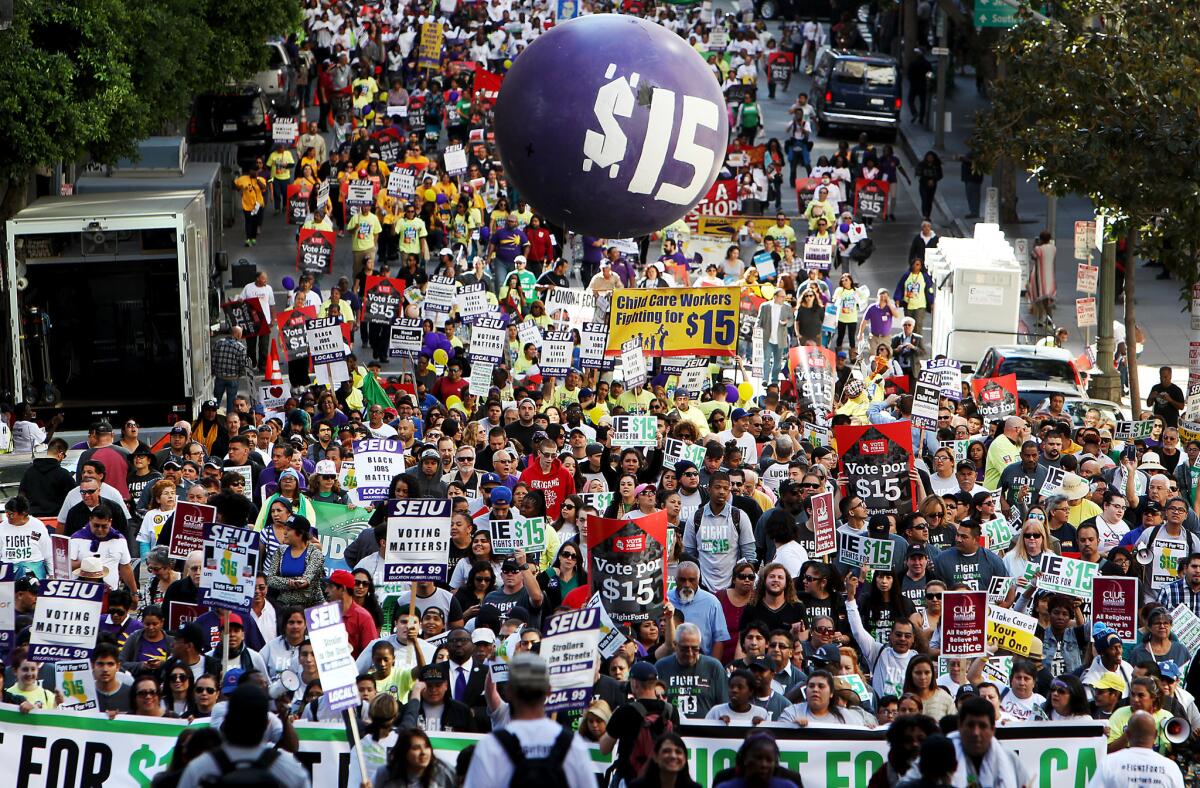How pay for the lowest wage earners has turned into a national fight

Workers march through the financial district of Los Angeles last November to press demands for a minimum wage of $15 per hour.
Alabama is one of a handful of states without a minimum wage law on the books, and for the foreseeable future it’s going to stay that way. Gov. Robert J. Bentley on Thursday signed into law a measure prohibiting municipalities from establishing a minimum wage.
The law, which sailed through the Legislature, came in response to Birmingham, which passed an ordinance setting a minimum hourly wage of $10.10.
Alabama’s action came as cities, counties and states debate whether to raise the minimum wage—or to have one at all.
Supporters say that hiking the minimum wage helps working-class people survive. Opponents say such measures retard growth and encourage employers to relocate to less expensive locales.
Describing the minimum wage landscape nationwide gets tricky because it’s, well, complicated. In some jurisdictions, a minimum wage law applies only to larger employers, not smaller ones—and the definition of what’s large and what’s small varies. In some jurisdictions, it's tied to whether employees receive health insurance.
Thanks to the U.S. Department of Labor, the UC Berkeley Center for Labor Research and Education, and the Pew Charitable Trusts, here’s a quick look at the minimum wage issue, in nine numbers:
5
States without a minimum wage law: Alabama, Louisiana, Mississippi, South Carolina and Tennessee.
14
States where the minimum wage equals the federal minimum wage of $7.25: Iowa, Idaho, Indiana, Kansas, Kentucky, North Carolina, North Dakota, New Hampshire, Oklahoma, Pennsylvania, Texas, Utah, Virginia and Wisconsin.
17
States prohibiting cities from topping the state minimum wage. Alabama joined 16 others with such laws, according to Pew. Last September in Missouri, lawmakers overrode a gubernatorial veto to enact a law that prevents local entities from exceeding the state’s minimum wage level, currently $7.65.
29
States where the minimum wage exceeds the federal level. The long list includes Maine (the lowest at $7.65) as well as Ohio ($8.10), Rhode Island ($9.60), Colorado ($8.31) and Arizona ($8.05).
33
Cities and counties with minimum wage laws. According to the UC Berkeley labor center, only five localities had such measures before 2012.
$15
Minimum wage to be phased in over a few years in Los Angeles, Seattle and other jurisdictions.
$10.50
Minimum wage in the District of Columbia.
$10.50
Minimum wage in Los Angeles as of July 1. It will reach $15 by 2020.
$5.15
Minimum wage in Georgia and Wyoming.
ALSO
Ku Klux Klan rally in Anaheim erupts in violence
Suspected street racer held in crash that killed 3 and shut down 5 Freeway
New Disneyland pricing: $5 less on slow days and $20 more when it's busy
Sign up for Essential California
The most important California stories and recommendations in your inbox every morning.
You may occasionally receive promotional content from the Los Angeles Times.







